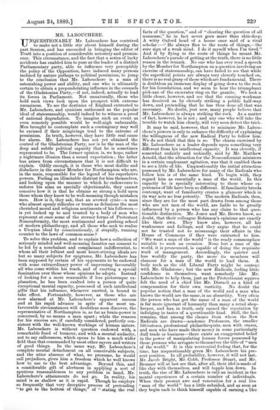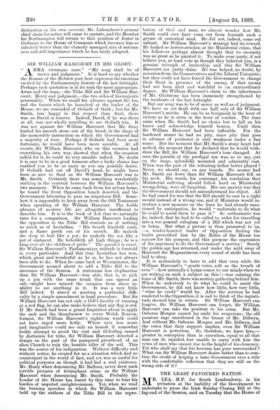MR LABOUCHERE. TT NQITESTIONABLY Mr. Labouchere has contrived to make not
a little stir about himself during the past Session, and has succeeded. in bringing the editor of Truth into a position of considerable notoriety and promin- ence. This circumstance, and the fact that a series of lucky accidents has enabled him to pose as the leader of a distinct Parliamentary party, able to influence very perceptibly the policy of the Opposition, have induced many persons inclined. by nature perhaps to political pessimism; to jump to the conclusion that Mr. Labouchere is a man of astonishing power and ability, and one who is ultimately certain to obtain a preponderating influence in the counsels of the Gladstonian Party,—if not, indeed, actually to lead its forces in Parliament. Not unnaturally, those who hold such views look upon the prospect with extreme uneasiness. To see the destinies of England entrusted to Mr. Labouchere, and cynicism enthroned as the popular ideal of statesmanship, would indeed be to witness a proof of national degradation. To imagine such an event as even remotely possible would be well-nigh unbearable. Men brought to contemplate such a contingency may well be excused if their misgivings tend to the extreme of pessimism. In truth, however, they have little real cause for alarm. Mr. Labouchere has not yet obtained the control of the Gladstonian Party, nor is he the man of the deep and subtle political capacity that he is sometimes represented to be. The former opinion is, we hope, rather a nightmare illusion than a sound expectation ; the latter has arisen from circumstances that it is not difficult to explain. Oddly enough, it is those who most dislike and disbelieve in the senior Member for Northampton who are, in the main, responsible for the legend of his superlative powers. Feeling an illimitable distrust for him themselves, and looking upon the manner in which he endeavours to enforce his aims as specially objectionable, they cannot conceive how it is that he obtains so strong a hold upon those whom they know to be well-meaning though mistaken men. How is it, they ask, that an avowed cynic—a man who almost openly ridicules or treats as delusions the most cherished moral and religious sentiments of his followers— is yet looked up to and trusted by a body of men who represent at once some of the sterner forms of Protestant Nonconformity, the most sentimental and gushing school of modem philanthropy, and all those who seek to realise a Utopian ideal by conscientiously, if stupidly, running counter to the laws of common-sense To solve this problem, and to explain how a collection of seriously minded and well-meaning fanatics can consent to be led by a nonchalant and complaisant indifferentist, to whom all their loftiest and most heart-stirring ideals are but so many subjects for epigrams, Mr. Labouchere has been supposed by certain of his opponents to be endowed with some extraordinary power of impressing favourably all who come within his reach, and of exerting a special fascination over those whose opinions he adopts. Instead. of looking for a more reasonable if less picturesque ex- planation, he has been exalted into a person of quite exceptional mental capacity, possessed of such intellectual gifts that his influence, whenever exerted, is bound to take effect. Fortunately, however, as those who are now alarmed at Mr. Labouchere's apparent success and at his rapid advance in spite of the most un- favourable circumstances will doubtless soon discover, the representative of Northampton is, as far as brain-power is concerned, by no means a man apart ; while the reasons for his success are, if carefully considered, perfectly con- sistent with the well-known workings of human nature. Mr. Labouchere is without question endowed with, a remarkable fund. of humour, and with a mental audacity, not to say callousness, which opens to him a much wider field than that commanded by most other sayers and writers of good things. In the same way, Mr. Labouchere's complete mental detachment on all conceivable subjects, and the utter absence of what, we presume, he would call prejudices, gives him a freedom which he well knows how to use to the best advantage. Beyond this, and a considerable gift of alertness in applying a sort of spurious reasonableness to any problem in hand, Mr. Labouchere's attainments do not go. In reality, his mind is as shallow as it is rapid. Though he employs so frequently that very deceptive process of pretending "to get to the bottom of things," of " stating the real facts of the question," and of "clearing the question of all nonsense," he in fact never goes more than skin-deep, A witty Oxford head of a house once said of a rival scholar :—" He always flies to the roots of things,—the sure sign of a weak mind. I do it myself when I'm tired." And if by flying to the roots of things be meant Mr. La.bouchere's parade of getting at the truth, there is no little reason in the remark. No one who has ever read a speech by the Member for Northampton on a question involving an exercise of statesmanship, can have failed to see that while the superficial points are always very cleverly touched on, there is no real grasp of those which are fundamental. There is doubtless an immense display of going down to the rock for his foundations, and we seem to hear the triumphant pick-axe of the excavator ring on the granite. We look a little closer, however, and see that the cunning workman has deceived us by cleverly striking a pebble half-way down, and pretending that he has thus done all that was necessary. No doubt, just now, many people believe that Mr. Labouchere is always striking the rock. As a matter of fact, however, he is not ; and any one who will take the trouble to watch him closely, will very soon detect the trick..
It may be said, however, that to minimise Mr. La.bou- chere's powers is only to enhance the difficulty of explaining the willingness of the new Radical Party to follow him. We do not think that this is so. The charm exercised by Mr. Labouchere as a leader depends upon something very different from his intellectual capacity. It was cleverly, if somewhat unfairly and unkindly, said by Mr. Matthew Arnold, that the attraction for the Nonconformist ministers in a certain unpleasant agitation, was that it enabled them to see a little of life. Unquestionably the initial attraction. possessed. by Mr. Labouchere for many of the Radicals who. follow him is of the same kind. To begin with, they regard. him as essentially a man of the world. In this capacity he is specially interesting to those whose ex- periences of life have been so different. If familiarity breeds contempt, want of familiarity creates a glamour which in its way acts no less potently. The modern Radicals, then, since they are for the most part drawn from among those who are not men of the world, are liable to be greatly influenced by a person who has any claim to that ques- tionable distinction. Mr. Jones and Mr. Brown know, no doubt, that their colleague Robinson's opinions are exactly like their own. They know also, however, all his weaknesses and failings, and they argue that he could, not be trusted. not to mismanage their affairs in the House of Commons if they were entrusted to him. " We want a man of the world " is the ready commonplace suitable to such an occasion. None but a man of the world, it is pronounced, is capable of doing the requisite work of management. Accordingly, the quieter an& less worldly the party, the more its members will clamour for a man of the world to lead them. A. body such as the old Liberal Party might be content with Mr. Gladstone ; but the new Radicals, feeling little confidence in themselves, want somebody like Mr. Labouchere to help them, just as the Protectionist squires felt the need of a chief like Mr. Disraeli as a kind of compensation for their own rusticity. No doubt the popular notion that a man of the world and a man who knows the world are the same, is an absurdity. Very often the person who has got the name of a man of the world is far more ignorant of humanity than many a retail shop- keeper, and has, in truth, only earned the reputation by indulging in tastes of a questionable kind. Still, the fact remains, that among the classes from whom the New Radicals are drawn—academic Professors, the smaller litterateurs, professional philanthropists, men with crazes, and men who have made their money in some particularly dull trade or business—there exists an exaggerated belief in the power of manipulating human forces possessed by those persons who arrogate to themselves the title of " men of the world." It is this reverential feeling that, for the time, has unquestionably given Mr. Labouchere his pre- sent position. In all probability, however, it will not last. Mr. Jacob Bright, Mr. Cobb, Professor Stuart, and Mr. Brunner will at last see that, after all, their idol is made of like clay with themselves, and will topple him down. In truth, the rise of Mr. Labouchere is only an incident in the mental experiences of a certain number of individuals. When their present awe and veneration for a real live " man of the world " has a little subsided, and as soon as they begin each to think himself capable of earning a like distinction on his own account, Mr. Labouchere's present chief claim for notice will cease to operate, and the Member for Northampton will return to that position of Jester in Ordinary to the House of Commons which becomes him so infinitely better than the clumsily managed airs of serious- ness and self-importance which he has lately adopted.



































 Previous page
Previous page